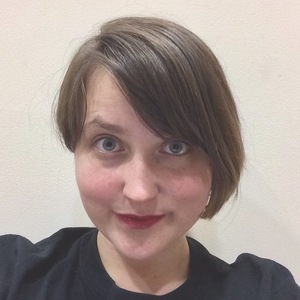

Laken Brooks
When Laken Brooks was 6 or 7, she vaguely remembers writing a poem about clouds on a napkin while sitting outside an ice cream parlor. However, she really didn't get serious about her poetry until after she entered Emory & Henry College, Emory, Virginia.
"For most of my life, I did not hold an interest in poetry. Math and formulas have always intimidated me, so I hated the idea of writing with a set number of syllables. It was only when I entered Dr. Felicia Mitchell's haiku class at Emory & Henry College last year that I began not only writing poetry but appreciating it," Laken says.
The genre began to interest her so much that she wrote a chapbook of poetry, "Inside The Dark Room," which is available from Amazon.
"The book is a collection of 20 different poems concerning virginity, the connection of women to the earth, sexual violence, coming of age and breaking through traditional roles of domesticity," she says.
These themes are prevalent throughout Laken's poetry. "I hesitate to identify my biggest influences, but some major topics of my work are gender norms and femininity, divinity and socioeconomic status. Voices from the Renaissance and romantic periods, with their vivid nature images, frequently inspire me. The nature of this region and my connection to rural Appalachia definitely influence my writing.
"I oftentimes analyze water as an image in my poems, as well as the role of women within the culture of farming communities. The process of writing about these subjects helps me investigate my own identity as an Appalachian woman, trying to reconcile my goal of entering academia with the regional social stigmas against higher education as "rising above your raising.'"
Poetry speaks to Laken because of its juxtaposition between centuries of literary
tradition and its efforts to break those traditions and make itself into something new.
"I find it amazing that poetry is the thread connecting readers and writers with the emotions and the ideas of the greats (Shakespeare, Browning, Keats, Shelley, etc.), allowing contemporary poets of all ability levels to participate in adding to that tradition of writing poems.
"Prose is, in of itself, a noble form. The difference between poetry and prose, as paraphrased from Poe, is that prose aims to show truth while poetry works to conceal truth, to share a message in a veiled way. Poems are puzzles, carefully crafted to convey an idea - as a reader, you have to be genuinely invested in analyzing them, picking apart every syllable and comma to discover the meaning of the poem."
The quiet, personal scrutiny that poetry requires is another reason Laken says poetry is important – not just personally, but to society.
"Poetry is important to society because it forces us to actually listen; since the true messages of poems are concealed with figurative language and metaphors, a reader must be attentive. Poems require patience, especially the shorter poems (such as haiku).
"In contemporary Western society, we are frequently too busy to actually slow down and take the time to analyze a message. We live within the information age and are impatient with receiving information, used to a quick Google search that can tell us what we need to know, so poems can help calm our souls and teach us discipline," she says.
Laken enjoys teaching, visiting art galleries, leading community service initiatives, reading and writing. She is a fan of photography, traveling, theater, visiting thrift stores and knitting.
"My career plans are a bit fuzzy as of now. I am passionate about literature and education, so I am very much considering teaching literature at a secondary or collegiate level. However, I also plan on studying publishing, and I think I would be very happy in a publishing house. I hope to be accepted to graduate school to study Renaissance literature. During my studies, I plan to continue writing poems (even if it's just as a hobby)," Laken says.
She is the granddaughter of Lake and Pauline Brooks and is a junior studying literature at Emory & Henry College.